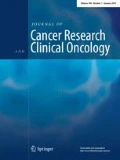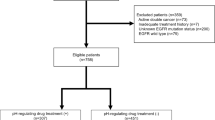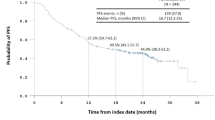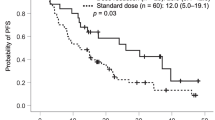Abstract
Background
Tyrosine-kinase inhibitors (TKIs) and chemotherapy had different pharmacological mechanisms and therefore combined administration of TKIs and chemotherapy agents may have synergy. Our research aimed at exploring the cytotoxic interactions between gefitinib and docetaxel with different concentrations for non-small-cell lung cancer cell lines, and furthermore, the mechanisms underlying the cytotoxic synergism.
Methods
NCI-H1650 [epidermal growth factor receptor (EGFR) mutation and KRAS wild-type], NCI-H292 (EGFR wild-type and KRAS wild-type) and A549 (EGFR wild-type and KRAS mutation) cell lines were treated with docetaxel and/or gefitinib. Cytotoxic interactions, cell cycle distribution and cell signal pathway were analyzed, respectively.
Results
Cytotoxic interactions between docetaxel and gefitinib were dose-dependent and sequence-dependent in all these three cell lines. Docetaxel followed by gefitinib treatment was optimum regimen regardless of the mutation status of EGFR and KRAS. KRAS mutation and EGFR wild-type predicted insensitive to gefitinib and docetaxel combined treatment as well as gefitinib alone. G1 arrest was inconsistently associated with combination index (CI). However, apoptosis induction was schedule-dependent and can explain the synergism completely. Mitogen-activated protein kinase (MAPK) phosphorylation ratio was also schedule-dependent and positively correlated with CI.
Conclusion
Cytotoxic interactions between docetaxel and gefitinib were sequence-dependent regardless of the mutation status of EGFR and KRAS. Cell characteristic, apoptosis induction and MAPK phosphorylation but not cell cycle change may explain the molecular mechanisms of synergism.





Similar content being viewed by others
References
Baselga J, Arteaga CL (2005) Critical update and emerging trends in epidermal growth factor receptor targeting in cancer. J Clin Oncol 23:2445–2459
Bell DW, Lynch TJ, Haserlat SM, Harris PL, Okimoto RA, Brannigan BW et al (2005) Epidermal growth factor receptor mutations and gene amplification in non-small-cell lung cancer: molecular analysis of the IDEAL/INTACT gefitinib trials. J Clin Oncol 23:8081–8092
Bonanno L, Schiavon M, Nardo G, Bertorelle R, Bonaldi L, Galligioni A, Indraccolo S, Pasello G, Rea F, Favaretto A (2010) Prognostic and predictive implications of EGFR mutations, EGFR copy number and KRAS mutations in advanced stage lung. adenocarcinoma. Anticancer Res 30(12):5121–5128
Chou TC (2006) Theoretical basis, experimental design, and computerized simulation of synergism and antagonism in drug combination studies. Pharmacol Rev 58:621–681
Chun PY, Feng FY, Scheurer AM, Davis MA, Lawrence TS, Nyati MK (2006) Synergistic effects of gemcitabine and gefitinib in the treatment of head and neck carcinoma. Cancer Res 66:981–988
Davies AM, Ho C, Lara PN Jr et al (2006) Pharmacodynamic separation of epidermal growth factor receptor tyrosine kinase inhibitors and chemotherapy in non-small-cell lung cancer. Clin Lung Cancer 7:385–388
Eberhard DA, Johnson BE, Amler LC (2005) Mutations in the epidermal growth factor receptor and in KRAS are predictive and prognostic indicators in patients with non-small-cell lung cancer treated with chemotherapy alone and in combination with erlotinib. J Clin Oncol 23:5900–5909
Furugaki K, Iwai T, Shirane M, Kondoh K, Moriya Y, Mori K (2010) Schedule-dependent antitumor activity of the combination with erlotinib and docetaxel in human non-small cell lung cancer cells with EGFR mutation, KRAS mutation or both wild-type EGFR and KRAS. Oncol Rep 24(5):1141–1146
Gandara DR, Davies AM, Gautschi O, Mack PC, Lau DH, Lara PN Jr et al (2007) Epidermal growth factor receptor inhibitors plus chemotherapy in non-small-cell lung cancer: biologic rationale for combination strategies. Clin Lung Cancer 8(Suppl. 2):S61–S67
Gatzemeier U, Pluzanska A, Szczesna A, Kaukel E, Roubec J, DeRosa F et al (2007) Phase III study of erlotinib in combination with cisplatin and gemcitabine in advanced non-small-cell lung cancer: the tarceva lung cancer investigation trial. J Clin Oncol 25:1545–1552
Giaccone G, Herbst RS, Manegold C, Scagliotti G, Rosell R, Miller V et al (2004) Gefitinib in combination with gemcitabine and cisplatin in advanced non-small-cell lung cancer: a phase III trial—INTACT 1. J Clin Oncol 22:777–784
Giovannetti E, Lemos C, Tekle C, Smid K, Nannizzi S, Rodriguez JA, Ricciardi S, Danesi R, Giaccone G, Peters GJ (2008) Molecular mechanisms underlying the synergistic interaction of erlotinib, an epidermal growth factor receptor tyrosine kinase inhibitor, with the multitargeted antifolate pemetrexed in non-small-cell lung cancer. Cells Mol Pharmacol 73:1290–1300
Gow C-H, Chang Y-L, Hsu Y-C et al (2009) Comparison of epidermal growth factor receptor mutations between primary and corresponding metastatic tumors in tyrosine kinase inhibitor-naive non-small-cell lung cancer. Ann Oncol 20:696–702
Herbst RS, Giaccone G, Schiller JH, Natale RB, Miller V, Manegold C et al (2004) Gefitinib in combination with paclitaxel and carboplatin in advanced non-small-cell lung cancer: a phase III trial—INTACT 2. J Clin Oncol 22:785–794
Jemal A, Siegel R, Ward E, Hao Y, Xu J, Thun MJ (2009) Cancer statistics, 2009. CA Cancer J Clin 59:225–249
Jiang Y, Li C, Ma Y, Chen J, Li Y, Chen L (2012) The inhibition of the pemetrexed-activated MAPK pathway via sorafenib is involved in the synergistic mechanism of sorafenib subsequent potentiation of pemetrexed cytotoxicity in EGFR TKI-resistant cell lines. Clin Lab 58(5–6):551–561
Kim YH, Lee YJ (2006) Time sequence of tumor necrosis factor-related apoptosis-inducing ligand (TRAIL) and cisplatin treatment is responsible for a complex pattern of synergistic cytotoxicity. J Cell Biochem 5:1284–1295
Lee HH, Ye S, Li XJ, Lee KB, Park MH, Kim SM (2014) Combination treatment with paclitaxel and doxorubicin inhibits growth of human esophageal squamous cancer cells by inactivation of Akt. Oncol Rep 31:183–188
Li T, Ling YH, Goldman ID, Perez-Soler R (2007) Schedule-dependent cytotoxic synergism of pemetrexed and erlotinib in human non-small cell lung cancer cells. Clin Cancer Res 13:3413–3422
Luk PP, Galettis P, Links M (2011) ERK phosphorylation predicts synergism between gemcitabine and the epidermal growth factor receptor inhibitor AG1478. Lung Cancer 12:7–16
MacKeigan JP, Taxman DJ, Hunter D, Earp HS 3rd, Graves LM, Ting JP (2002) Inactivation of the antiapoptotic phosphatidylinositol 3-kinase-Akt pathway by the combined treatment of taxol and mitogen-activated protein kinase kinase inhibition. Clin Cancer Res 8:2091–2099
Maemondo M, Inoue A, Kobayashi K, Sugawara S, Oizumi S, Isobe H, Gemma A, Harada M, Yoshizawa H, Kinoshita I, Fujita Y, Okinaga S, Hirano H, Yoshimori K, Harada T, Ogura T, Ando M, Miyazawa H, Tanaka T, Saijo Y, Hagiwara K, Morita S, Nukiwa T (2010) Gefitinib or chemotherapy for non-small-cell lung cancer with mutated EGFR. N Engl J Med 362:2380–2388
Mahaffey CM, Davies AM, Lara PN Jr et al (2007) Schedule-dependent apoptosis in K-ras mutant non-small-cell lung cancer cell lines treated with docetaxel and erlotinib: rationale for pharmaco-dynamic separation. Clin Lung Cancer 8:548–553
Masago K, Fujita S, Togashi Y, Kim YH, Hatachi Y, Fukuhara A, Nagai H, Sakamori Y, Mio T, Mishima M (2011) Clinicopathologic factors affecting the progression-free survival of patients with advanced non-small-cell lung cancer after gefitinib therapy. Clin Lung Cancer 12:56–61
Mok TS, Wu YL, Thongprasert S, Yang CH, Chu DT, Saijo N, Sunpaweravong P, Han B, Margono B, Ichinose Y, Nishiwaki Y, Ohe Y, Yang JJ, Chewaskulyong B, Jiang H, Duffield EL, Watkins CL, Armour AA, Fukuoka M (2009) Gefitinib or carboplatin-paclitaxel in pulmonary adenocarcinoma. N Engl J Med 361:947–957
Mosmann T (1983) Rapid colorimetric assay for cellular growth and survival: application to proliferation and cytotoxicity assays. J Immunol Methods 65:55–63
Piperdi B, Ling YH, Perez-Soler R (2007) Schedule dependent interaction between the proteosome inhibitor bortezomib and the EGFR-TK inhibitor erlotinib in NSCLC cell lines. J Thorac Oncol 2:715–721
Ramalingam S, Pawlish K, Gadgeel S, Demers R, Kalemkerian GP (1998) Lung cancer in young patients: analysis of a surveillance, epidemiology, and end results database. J Clin Oncol 16:651–657
Riely GJ, Pao W, Pham D, Li AR, Rizvi N, Venkatraman ES, Zakowski MF, Kris MG, Ladanyi M, Miller VA (2006) Clinical course of patients with non-small cell lung cancer and epidermal growth factor receptor exon 19 and exon 21 mutations treated with gefitinib or erlotinib. Clin Cancer Res 12:839–844
Roberts PJ, Stinchcombe TE, Der CJ, Socinski MA (2010) Personalized medicine in non-small-cell lung cancer: is KRAS a useful marker in selecting patients for epidermal growth factor receptor-targeted therapy? J Clin Oncol. 28(31):4769–4777
Sharma SV, Bell DW, Settleman J, Haber DA (2007) Epidermal growth factor receptor mutations in lung cancer. Nat Rev Cancer 7:169–181
Shepherd FA, Rodrigues Pereira J, Ciuleanu T et al (2005) Erlotinib in previously treated non-small-cell lung cancer. N Engl J Med 353:123–132
Sordella R, Bell DW, Haber DA, Settleman J (2004) Gefitinib-sensitizing EGFR mutations in lung cancer activate anti-apoptotic pathways. Science 305:1163–1167
Tianhong Li, Ling Y-H, Goldman ID et al (2007) Schedule-Dependent Cytotoxic Synergism of Pemetrexed and Erlotinib in Human Non Small Cell Lung Cancer Cells. Clin Cancer Res 13:3413–3422
Tsao MS, Sakurada A, Cutz JC et al (2005) Erlotinib in lung cancer molecular and clinical predictors of outcome. N Engl J Med 353:133–144
Yacoub A, Han SI, Caron R, Gilfor D, Mooberry S, Grant S, Dent P (2003) Sequence dependent exposure of mammary carcinoma cells to Taxotere and the MEK1/2 inhibitor U0126 causes enhanced cell killing in vitro. Cancer Biol Ther 6:670–676
Acknowledgments
We thank Dr. Li of IMM have provided us cell lines and drug.
Conflict of interest
None declared.
Author information
Authors and Affiliations
Corresponding author
Rights and permissions
About this article
Cite this article
Jiang, Y., Yuan, Q. & Fang, Q. Schedule-dependent synergistic interaction between docetaxel and gefitinib in NSCLC cell lines regardless of the mutation status of EGFR and KRAS and its molecular mechanisms. J Cancer Res Clin Oncol 140, 1087–1095 (2014). https://doi.org/10.1007/s00432-014-1671-x
Received:
Accepted:
Published:
Issue Date:
DOI: https://doi.org/10.1007/s00432-014-1671-x




